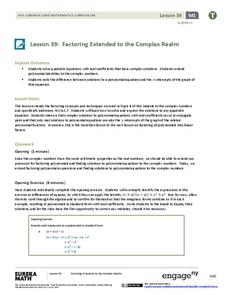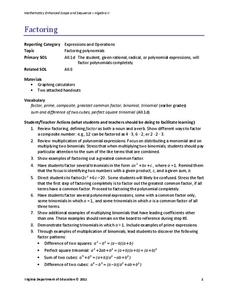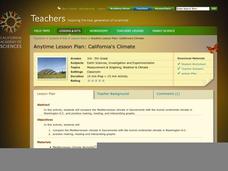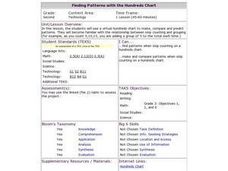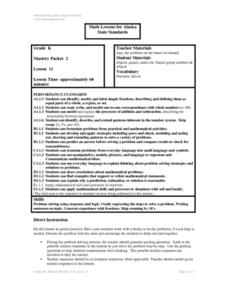EngageNY
Factoring Extended to the Complex Realm
A solution will work one way or another: find solutions, or use solutions to find the function. Learners use polynomial identities to factor polynomials with complex solutions. They then use solutions and the Zero Product Property to...
Virginia Department of Education
Factoring
Uncover the relationship between factoring quadratics and higher degree polynomials. Learners develop their factoring skills through repetition. A comprehensive instructional activity begins with quadratics and shows how to use the same...
California Academy of Science
California's Climate
The United States is a large country with many different climates. Graph and analyze temperature and rainfall data for Sacramento and Washington DC as you teach your class about the characteristics of Mediterranean climates. Discuss the...
Scholastic
Study Jams! Stem-and-Leaf Plots
Organizing data doesn't have to be boring when you introduce stem and leaf plots to the lesson. In a step-by-step interactive lesson, learners can see how to put data into one of these plots and easily see any patterns. Included are test...
Curated OER
What's in the Bag?
Help your students identify the attributes of two-dimensional shapes. They read the book Round is a Mooncake, and use pattern blocks to sort shapes. Students sort shapes according to their attributes.
West Contra Costa Unified School District
Fractional Exponents and Property of Exponents
Don't just use a fraction of this resource ... use it all. Learners first investigate patterns to determine how to deal with fractional exponents. Individuals then evaluate expressions involving fractional exponents.
Virginia Department of Education
Rational Functions: Intercepts, Asymptotes, and Discontinuity
Discover different patterns by making connections between a rational function and its graph. An engaging instructional activity asks scholars to explore the behavior of different rational functions. Groups discover a connection between...
West Contra Costa Unified School District
Arithmetic Series
Fall for a series. Learners determine how to find out how far a skydiver falls in the first 20 seconds. The Algebra II lesson introduces the idea of adding up the terms of an arithmetic sequence. Pupils learn how to use Sigma notation to...
West Contra Costa Unified School District
Solving Inequalities
What does translating points on a number line have to do with solving inequalities? Young mathematicians first learn about translations of points on a number line, and then use this information to solve linear inequalities in one variable.
Mathematics Vision Project
Module 6: Modeling Periodic Behavior
Around and around we go ... again, and again, and again, and again! That's the nature of a periodic function. Young scholars learn how to model a periodic pattern with trigonometric functions. The nine-lesson unit explores the connection...
Curated OER
Measuring Pattern Block Angles
Sixth graders review the rotation of 180 and 360 degrees. Using the alphabet, they estimate the angle degree and identify the angles as either right, straight, obtuse or acute. In groups, they measure the pattern block angles and record...
Curated OER
Identifying Patterns
Students investigate the elements of a pattern. In this geometry instructional activity, students identify different shapes in a pattern and discover which shapes are missing in order to extend it. Students create their own patterns...
Curated OER
Finding Patterns with the Hundreds Chart
Young scholars review their numbers up to one hundred. Using a chart, they compare and predict patterns that might be in the numbers. They practice skip counting and grouping numbers. Using a spreadsheet, they graph different sets of...
Curated OER
Finding Addition Patterns
Students practice finding the sums of two-one digit numbers. For this addition lesson plan, students also record facts onto an addition chart.
Curated OER
Number Squares
In this order of numbers worksheet, students write a number in each square of a 9 square grid. Students must write the numbers in order down and across. Only one number is provided in each square.
Curated OER
Number Sequences
Students complete number sequencing activities. In this number sequencing lesson plan, students watch online clips about measurements. Students view a series of five numbers and write the amount jumped as part of a number sequence...
Albert Shanker Institute
Economic Causes of the March on Washington
Money can't buy happiness, but it can put food on the table and pay the bills. The first of a five-lesson unit teaches pupils about the unemployment rate in 1963 and its relationship with the March on Washington. They learn how to create...
Curated OER
Where Math Meets Poetry
Students identify Fibonacci's sequence of numbers and use the pattern to write poetry with one syllable words. In this math and writing lesson, students identify Fibonacci's sequence of numbers and learn about this early mathematician....
Curated OER
Modeling in Algebra
In this modeling in algebra worksheet, 8th graders solve ten different types of algebra problems, including 5 word problems. They first complete each table, describe the pattern used, and determine the 20th and nth term for each....
Curated OER
Patterns
Fourth graders investigate patterns and sequences. In this patterns and sequences lesson, 4th graders use a hundreds chart to build recurring patterns. Students skip count by threes and fives on a hundreds chart by coloring multiples...
Curated OER
Catch the Beat
Use this rhythm and pattern activity during transition times or on it own. Start by introducing a rhythm with 2, 3, or 4 beats; use your feet, hands, or entire body to demonstrate. Once learners have figured out the pattern, they join...
Curated OER
Fraction Problem Solving Process
Help your charges solve a variety of fraction and skip counting problems using a problem solving process. As a class they work through a fraction problem step-by-step, and discuss a real-life connection to the problem. Students then play...
Curated OER
Middle-East Reflections
Practice symmetry and patterns with this Mid-Eastern art project. Your class will create beautiful, reflective mosaics that will brighten up the classroom! A list of necessary materials is included.
Annenberg Foundation
Geometry 3D Shapes: Euler's Theorem
How do you get a theorem named after you? Euler knows what it takes! The third lesson of five asks pupils to use an interactive activity to compare the faces, vertices, and edges of seven different three-dimensional solids. They use...


